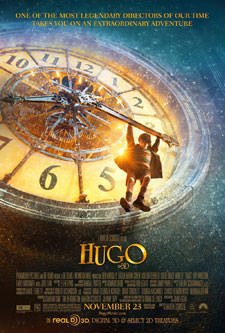Hugo (Martin Scorsese, 2011): USA
Reviewed by Byron Potau. Viewed at Edwards Cinemas, Santa Maria, CA.

This family friendly fable is both a departure for director Martin Scorsese and a film tailor made for him. At first glance Hugo is not the ideal material for Scorsese, more associated with violent gangster films, until you learn that the film is really about the beginnings of cinema, and film preservation, two subjects very near and dear to Scorsese’s heart.
Set in 1930’s Paris, Hugo (Asa Butterfield) is an orphan boy living in the inner workings of the clocks the Montparnasse train station. Unknown to anyone Hugo maintains the clocks, a job he took over from his alcoholic uncle who has abandoned the clocks and Hugo long ago. Hugo regularly has to steal food from the shops at the station to survive while avoiding the station constable, Inspector Gustav (Sacha Baron Cohen), who has a particular dislike for thieving orphan children.
Hugo’s other project is stealing parts to repair an automaton that he and his father were working on before he died in a fire. Hugo is convinced that repairing will reveal a message from his father.
While attempting to steal parts from a local shop he is caught by the shop owner, Georges Melies (Ben Kingsley) who confiscates Hugo’s book that has the designs for the automaton. To get it back Hugo agrees to work for Melies to earn his book back. Meanwhile, Hugo strikes up a friendship with Melies’s goddaughter, Isabelle (Chloe Moretz). He introduces her to the movies, which her godfather has never allowed her to see, and they discover that Melies was once a famous filmmaker but now largely forgotten.
Based on the children’s book by Brian Selznick, which in part is based on the real life of Georges Melies who was rediscovered working in a candy and toy shop in the Montparnasse train station in 1928, Scorsese is able to visually expound on his love of cinema, especially early cinema and its pioneers such as Melies. Scorsese uses montages of scenes from early silent classics, and pays homage to a famous scene from Harold Lloyd’s Safety Last, which Hugo and Isabelle sneak into a movie theater to see. He also does a magnificent job of recreating Melies’s films and filmmaking, showing him acting in and directing scenes in his famous glass studio among his wondrously imaginative sets.
Visually, Hugo is a feast for the eyes. With the help of Oscar winning Production Designer and Set Decorator Dante Ferretti and Francesca Lo Schiavo, and cinematographer Robert Richardson, Scorsese’s Paris is a magical dreamlike city of lights unlike what we’ve seen before and a perfect fit for the magical world of cinema.
Hugo and Isabelle are knowing and adventurous children, more developed and interesting than the standard child characters, and well played by Butterfield and Moretz.
Cohen gives a fine performance as a Clouseau like station Inspector with a metal brace on his leg trying to chase down orphan children in the train station with his Doberman. His performance is deftly balanced between his funny accent, bumbling slapstick patrolling of the station, and a more serious and sensitive side when he works up the courage to approach the flower girl that he has a crush on.
The best performance in the film comes from Ben Kingsley as Melies. Kingsley is able to subtly capture Melies’s youthful enthusiasm in his filmmaking days, and his deeply felt sorrow at having been forgotten by the world that once embraced him and his work.
Hugo is a film lover’s dream and who could have been better to direct it than Scorsese, the ultimate film fan? His enthusiasm in making this film is palpable. Shot in 3D, which is another nod to Melies who probably would have embraced the format, it is only the second practical use of this medium that I have witnessed, the other being Werner Herzog’s Cave of Forgotten Dreams. Though it was fun to see it in 3D I don’t believe it is essential to see it that way. It’s still a gimmick, but one that is more masterfully handled by Scorsese than other directors, and here it only adds to what is already a delightful viewing experience. One day it will be time to preserve this film so that others may experience it in all of its splendor. Watching this film reminds us why that is so important not just for this film but for so many others.
About this entry
You’re currently reading “Hugo (Martin Scorsese, 2011): USA,” an entry on Student Film Reviews
- Published:
- 12.31.11 / 1am
- Category:
- Films
3 Comments
Jump to comment form | comments rss [?] | trackback uri [?]